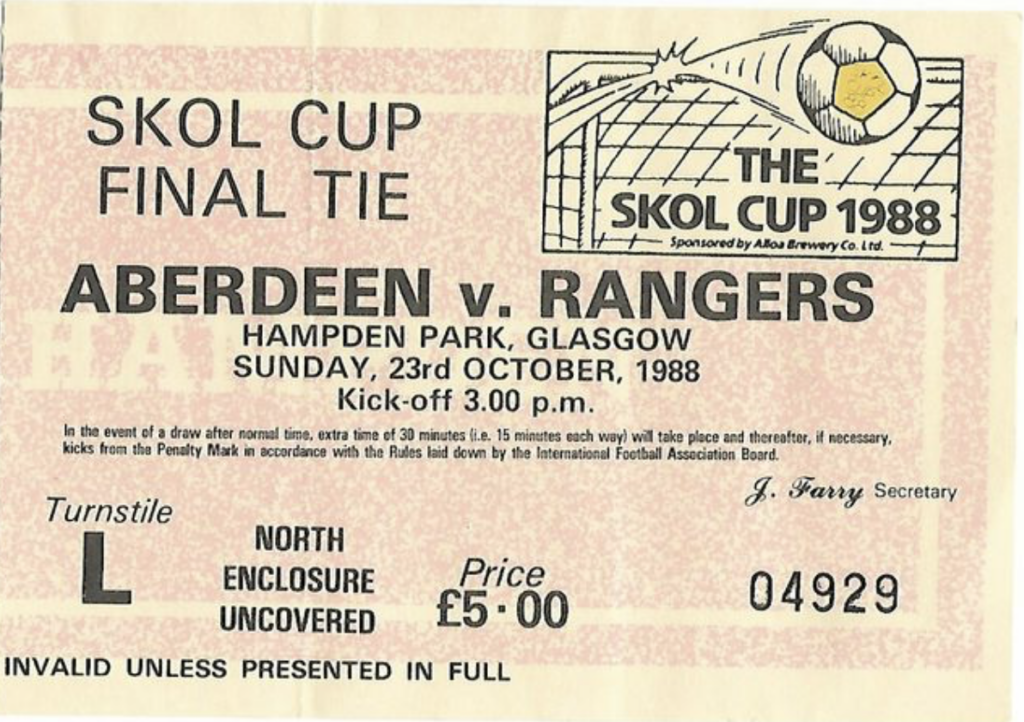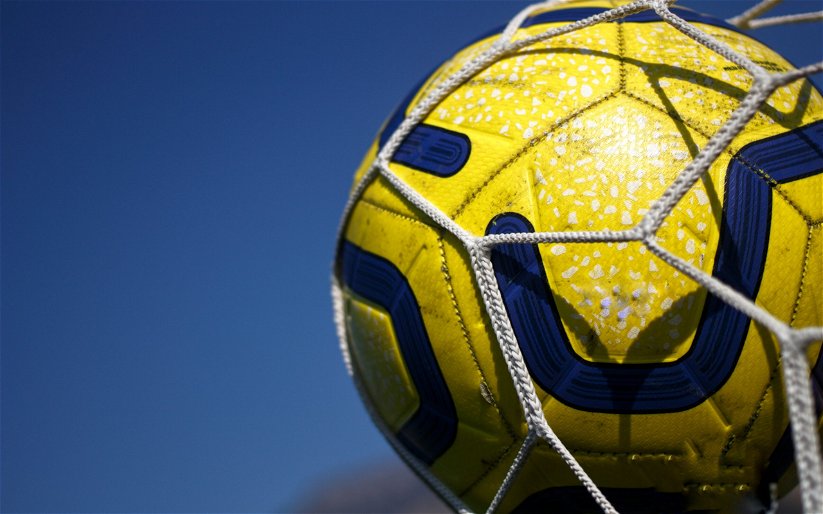By Alistair Aird
Rangers face Aberdeen at Hampden Park on Sunday afternoon. It’s the seventh time the teams have met in a League Cup Final – Rangers have won five, with Aberdeen’s only triumph coming in season 1989/90 – and at stake is the first piece of domestic silverware of the season. Those wins over Aberdeen are among the record 27 times Rangers have lifted the League Cup, yet you have to go back to 2011 since the silverware sat bedecked in red, white, and blue ribbons in the Ibrox Trophy Room.
The sides contested the first-ever Final in April 1947 – Rangers won 4-0 – and again in March 1979. Rangers were victorious on that occasion too. But the focus of this ‘Blast from The Past’ will be what was the middle match in an epic trilogy of finals that were fought out in the late 1980s.
Everyone remembers the first one in October 1987 thanks to a blast of Davie Cooper’s left foot, a sublime display from Ian Durrant and a one-step run up in the penalty shoot out from Trevor Francis. And we probably prefer to forget the last of them, a Paul Mason double making the difference as the Dons claimed the trophy in season 1989/90.
But as magnificent as those matches were, I still maintain the match-up on 23 October 1988 was the best of the three. Here is how it all unfolded.
Reaching the League Cup Final was the norm for Rangers in the 1980s. After defeating Dundee United 2-1 to win the competition in season 1981/82, they made final in all but one of the seven seasons that followed. And of the five finals they contested, four were won – two against Celtic, one against Dundee United and one against Aberdeen – while the only loss had been in season 1982/83 against Celtic.
 In season 1988/89, it would be more of the same too. Goals from Kevin Drinkell, Mark Walters and Derek Ferguson got the campaign started with a comfortable 3-0 win over Clyde. A 6-0 thumping of Clydebank that saw six different players on the scoresheet followed, before Dundee were defeated 4-1 at Ibrox in the last eight. In the opinion of the Dundee manager, Dave Smith, his side were ‘five million light years behind Rangers’, and Graham Clark, writing in the Evening Times, reckoned it was ‘embarrassingly easy’ for the home side.
In season 1988/89, it would be more of the same too. Goals from Kevin Drinkell, Mark Walters and Derek Ferguson got the campaign started with a comfortable 3-0 win over Clyde. A 6-0 thumping of Clydebank that saw six different players on the scoresheet followed, before Dundee were defeated 4-1 at Ibrox in the last eight. In the opinion of the Dundee manager, Dave Smith, his side were ‘five million light years behind Rangers’, and Graham Clark, writing in the Evening Times, reckoned it was ‘embarrassingly easy’ for the home side.
The semi-final was straightforward too. The mercurial Mark Walters scored twice, and Scott Nisbet added another as Hearts were broken at Hampden. Rangers won 3-0, and awaiting Graeme Souness’s highflyers in the final were Aberdeen.
Rangers and Aberdeen were the two best sides in Scotland when they took to the field at Hampden Park. Both sides had played 10 league matches, with Rangers top of the table on 17 points and Aberdeen three adrift on 14.
Rangers had won eight, drawn one and lost one of their 10, scoring 18 goals and conceding just five. Five of the 18 goals had come on a glorious afternoon in late August when defending champions, Celtic, came to Ibrox and were thumped 5-1.
Aberdeen had opened with four straight draws before hammering Celtic 3-1 at Parkhead. Three wins and two draws followed, and one of those victories was over Rangers, a 2-1 win at Pittodrie on 8 October. More on that one shortly.
In the League Cup, Aberdeen had beaten Arbroath, Morton, Hibernian and Dundee United, scoring 10 goals and conceding two. Meanwhile, Rangers had shipped only one goal and knocked in 16 at the other end. With the sides having shared six goals 12 months earlier, it was a certainty that there would be goals in this to entertain the crowd of 72,122 that squeezed on to the slopes of the Hampden Park terraces.
There was an undercurrent to the encounter though. 15 days earlier the sides had met in the league at Pittodrie. There was always tension in the air ahead of matches between Rangers and Aberdeen. The fire had been stoked many times over the years, but this would be the occasion when the volcano erupted.
Nine minutes had elapsed when the referee, Louis Thow, blew for a free kick to Rangers. Like the livewire he was, Ian Durrant was already looking up to seek out a team mate with a quickly taken set piece. He never got the chance. Neil Simpson thrust his studs into the side of Durrant’s knee.
The damage was severe. Durrant ruptured three of the four knee ligaments and partially stretched the other one. His medial, anterior and posterior were gone and his lateral was stretched. For those who believe there is no malice in the challenge, look at a still image of Simpson’s contorted face. The perception from some may have been that he wasn’t intending to inflict an injury that would see Durrant undergo 14 operations, have 3,000-odd stitches inserted and rule Durrant out of action for the best part of three years. But his body shape suggested he most certainly had no intention of winning the ball.
Rangers recovered and ex-Don Neale Cooper fizzed in a shot that gave the visitors an interval lead. But Jim Bett equalised from the penalty spot and Charlie Nicholas headed the winner with five minutes remaining.
The loss was Rangers’ first domestic defeat since April – that was also against Aberdeen – but avenging that loss wasn’t the only motivating factor for Graeme Souness’s side as Hampden. They wanted to bring the trophy back to Ibrox for Durrant. Here was a player ahead of his time. Box-to-box with an eye for goal and a killer pass, he had the world at his feet only for it to be ripped away by one moment of recklessness.
 Durrant’s number 10 jersey at Hampden went to Neale Cooper. An Aberdeen icon, Cooper had been signed from Aston Villa to bolster the midfield. His inclusion made the lava bubble even more intensely as the Aberdeen fans saw ‘one of their own’ turning out in the colours of Rangers.
Durrant’s number 10 jersey at Hampden went to Neale Cooper. An Aberdeen icon, Cooper had been signed from Aston Villa to bolster the midfield. His inclusion made the lava bubble even more intensely as the Aberdeen fans saw ‘one of their own’ turning out in the colours of Rangers.
The stage was therefore set for another titanic tussle. And that is how it unfolded, although that was more to do with the footballing spectacle rather than any retribution from any vendettas that may still have lingered due to the wounds that hadn’t yet properly healed following the league encounter. Indeed, to illustrate latter point, only three players – Ian Ferguson, David Robertson, and Robert Connor – were booked over the course of the 90 minutes.
Robertson, who would become one of the greatest left backs ever to play for Rangers, had a horrendous afternoon. Perhaps the crowd or the occasion got to him, but he admitted himself in his autobiography, The Quiet Man Roars, that he didn’t play well.
The first of his litany of errors came after 14 minutes. Aberdeen won a throw and Robertson elected to pitch the ball back to his goalkeeper, Theo Snelders. But he left it short, and Kevin Drinkell nipped in and wriggled beyond the Dutch goalkeeper. Drinkell was hauled to the ground inside the box, and referee George Smith awarded a penalty kick. Ally McCoist stepped up and rammed the ball into the net with his right foot.
But withing six minutes, Aberdeen were level, and it wasn’t a goal the Rangers goalkeeper or central defenders will recall too fondly. John Hewitt flighted in a corner from the Aberdeen right and Woods, Gough and Butcher all went forward to try and clear any danger. All three missed the ball and it cannoned off the thigh of David Dodds and into the net.
The game was starting to open up now and young Robertson was almost punished again when Drinkell shrugged off his challenge and fizzed the ball across goal towards McCoist. Snelders got there first, though, parrying the ball away and sparing his team mate’s blushes.
Rangers regained the lead after 56 minutes. Walters won a throw in, and Gary Stevens launched a long throw into the box. Drinkell took a swipe at the ball and missed, but after one bounce, it sat up perfectly for Ian Ferguson to execute a stunning scissors kick that flashed beyond Snelders.
But once again, Aberdeen were not behind for long. Indeed, they had trailed for six minutes in the first half, and that’s exactly how long they were behind in the second. After Walters, the tournament’s joint-top goalscorer, had blazed a shot over the bar and McCoist had clipped the top of the crossbar with a cross from the left, Jim Bett stood up a great delivery to the far post and Dodds looped a header over Woods.
With a little under 30 minutes of regulation time left, the cup was up for grabs. The maligned Simpson almost caught Woods out with a chip shot before Jim Bett passed up a gilt-edged opportunity. In commentary, Archie McPherson referred to it as ‘the chance to win the cup’, but after getting in behind a flat-footed John Brown, the former Rangers midfielder skewed his shot wide of the post.
The action swung immediately to the other end, and McCoist slashed at a bouncing ball on the edge of the box with his left foot. His effort was sliced high, wide, and not so handsome, but his next involvement would have a more successful outcome.
McCoist loved the League Cup. Since joining Rangers in 1983 he had won the competition four times and would go on to add a further five winners’ medals before leaving Ibrox in 1998. His tally of 54 goals in the competition marks him out as the club’s top goalscorer in the League Cup, and goal number 27 of that 54 would be the one that would annex the trophy on this occasion.
With two minutes remaining, the hapless Robertson failed to control the ball and when it bounced into the path of Stevens, Snelders had to show good dexterity to deny the Englishman with his feet. But from the ensuing corner, Gough’s header caused havoc and when it broke to McCoist on the edge of the six-yard box, there was only going to be one outcome. He hadn’t established a reputation for being the finest purveyor of the art of goalscoring by missing chances like this after all.
‘The winner is one of those chances a striker is paid to take, and it was magic to see it hit the back of the net at the Rangers end,’ admitted McCoist afterwards.
Winning the first available trophy against the side that are vying with you for top spot naturally boosts confidence, and Rangers used the victory to establish a solid foundation upon which to build their challenge for the league title.
There were some bumps along the road- namely a defeat against Celtic at Parkhead in November and back-to-back losses before Christmas against Dundee United and Hearts – but another emphatic win over Celtic in January was a clear statement of intent. It also effectively ended any hopes Celtic had of retaining the title. In the days of two points for a win, Celtic now trailed Rangers by seven points.
Rangers then turned on the afterburners and blew away the challenge of the others too. In the twelve league games that followed the Old Firm victory, Rangers won 10, drew one and lost one. Nine of the victories were in succession too. The first of the nine-in-a-row was secured with a 4-0 win over Hearts, Rangers topping the table with 56 points. Aberdeen were runners-up with 50.
Thus, winning the League Cup can undoubtedly imbue a side with confidence. Indeed, in the 27 seasons in which Rangers have won the League Cup, they have gone on to be crowned league champions on 17 occasions.
Let’s hope therefore that success on Sunday can lead to a similar outcome in May 2024 as our journey from terrible to Treble continues.




